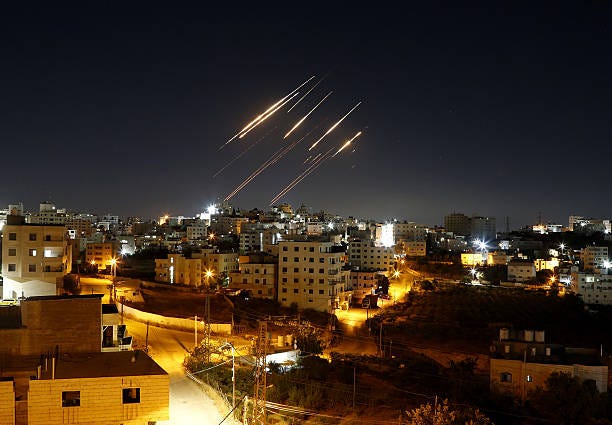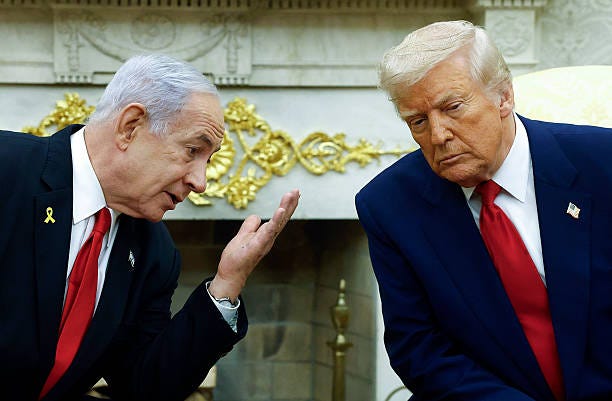Newell: Unveiling the Israel-Iran Conflict and Israel’s Internal Divide Over Netanyahu's Agenda, with Ex-Colonel Alex Ganos

Dramatic imagery of the Iranian retaliation on Tel Aviv and other Israeli cities is circulating across the Internet and social media.
However, much of the footage and coverage from this region can be difficult to interpret. Although it's rare, if not impossible, to come across fully unbiased analysis on these matters, it's important to put in the work to find information from firsthand sources that are actually on the ground, people who are there and have a wealth of knowledge on the subject.
Former Israeli Air Force Colonel Alex Gan, who still resides in Israel, is a routine guest of my show. He came on today to explain what it’s like right now in Israel. He talks about the country's morale, Israel's polarized feelings toward its leadership, its stance on U.S. involvement, and how he thinks the country ought to strategically advance as it navigates growing conflicts.
Currently, Iran is sending waves of missiles into Israel, some breaching the Iron Dome and destroying buildings in civilian areas. However, Gan explains that Israel's intelligence gives civilians a small window to prepare and seek shelter before these missiles hit.
“About half an hour before the missiles are fired, we get a warning from intelligence agents over in Iran,” says Gan. “This means get ready and be somewhere near your shelter. After the missile is fired, it takes about 10-12 minutes to get here.”
“My youngest daughter lives in Haifa,” Gan explains. “A missile hit about half a mile from their house, and she sits in the shelter with my three grandchildren because her husband is in the army. We talk on the phone, and we hope everything goes ok. And we know we have to pull through. I always say, don't forget the people of London did that for a year and a half under the Blitz.”
Unpacking the Iran-Israel conflict
The conflict between the two nations began when Israel issued sweeping pre-emptive air raids on Iranian nuclear facilities , after Iran had violated international sanctions and continued developing nuclear weapons.
Gan explains that although Israel is embroiled in ongoing conflict with Hamas and now Iran, tensions with surrounding areas have quieted down in recent years.
“Before October 7th, we’ve felt Iran is trying to close in on us. With Iraq and Syria and Lebanon and Gaza, and Yemen. All those countries were pointing their missiles and aiming at us. Now, we’re 619 days after that, and we feel the balance has turned 180 Degrees. Lebanon is out of the game. Syria is out of the game. Iraq is out of the game. Gaza, there is still fighting going on, but there are no missiles from there,” says Gan.
Regarding Israel’s decision to act preemptively against Iran’s nuclear capabilities, Gan explains that it was, in the eyes of national self-interest, a necessary move. He also says that even though heavy retaliation was expected, in an arms race, Israel maintains the upper hand.
“What we had to go over was the barrier of fear. We did it twice. Once in Lebanon , where we started to attack Hezbollah, and now with Iran,” says Gan. “They still have a huge amount of ballistic missiles, but the damage we can cause Iran is much bigger than they can cause to us.
Now, Israel has to decide on charting a path forward. But Gan explains that there's a conflict over what direction to take, given their path depends on how Iran continues to engage and how allies, most notably the United States, respond.
"I think what happened there is that the regime in Iran is conflicted between having a Nuclear Missile or losing the regime. So we’ll see what will happen,” Gan states. “I was waiting for Trump…to go public and tell Tehran that you have three days to come back to the negotiation and tell us you’re going to close your nuclear program, or we will attack you . But it’s hard to predict what he will do.”
Israel remains deeply divided on Netanyahu
While many outsiders often view Israel as a united front politically, the reality is anything but. For example, most Israeli voters disapprove of the current leader, Benjamin “Bibi” Netanyahu, with over 70% wanting him to resign , especially given that some accuse him of dragging out conflicts in Gaza and Iran in his own self-interest.

“We were always divided regarding Bibi,” explains Gan. “Bibi, he’s trying his best not to end the war in Gaza because you don't go to elections during the war. And he’s not responsible for what happened in Gaza. He’s never responsible for anything that goes wrong. He always takes the credit for everything that goes well. It's a big issue. Those who hate him still hate him. Those who worship him still worship him.”
However, Gan says that Netanyahu’s approval has gone up since the war with Gaza began, regardless of prior scandals.
“I think he will gain more votes now…Now that the Israeli Air Force and Mossad are removing the biggest threat to the existence of Israel, which is the nuclear program,” says Gan. “But I want to remind you he’s still on trial for corruption , and this trial will still take forever as far as he’s concerned.”
Israel failed attempts to negotiate the freedom of hostages
Gan expressed his frustration over the fact that Israeli hostages have yet to be returned to their homeland. “We should have finished it a long time ago,” says Gan. “It’s unacceptable toward the people and unacceptable toward our values as a nation.”
Gan explains that Israeli intelligence has confidence in the state of the remaining hostages, including how many are still alive.
“We know quite a lot about the hostages. I think there are 52 in total. We know that 20 are still alive, and we know that 22 are dead. But those that are alive will not remain alive for very long," warns Gan.
The ex-military officer also explains how the strategy to eradicate Hamas in order to obtain hostages is an exercise in futility, and that the best way to obtain the hostages is through negotiation rather than by force.
“The war over there is going to kill them (the hostages),” Gan explains. “You can’t kill the last Hamas person. Hamas is an idea. It's an ideology. I think if we do the right deal, which will be: get all the hostages back at one time; get out of Gaza; make sure Gaza remains free of weapons, and Hamas leaders leave Gaza. It can be done. But again, I’m not sure the government wants it, for their own agenda.”
Post a Comment for "Newell: Unveiling the Israel-Iran Conflict and Israel’s Internal Divide Over Netanyahu's Agenda, with Ex-Colonel Alex Ganos"
Post a Comment